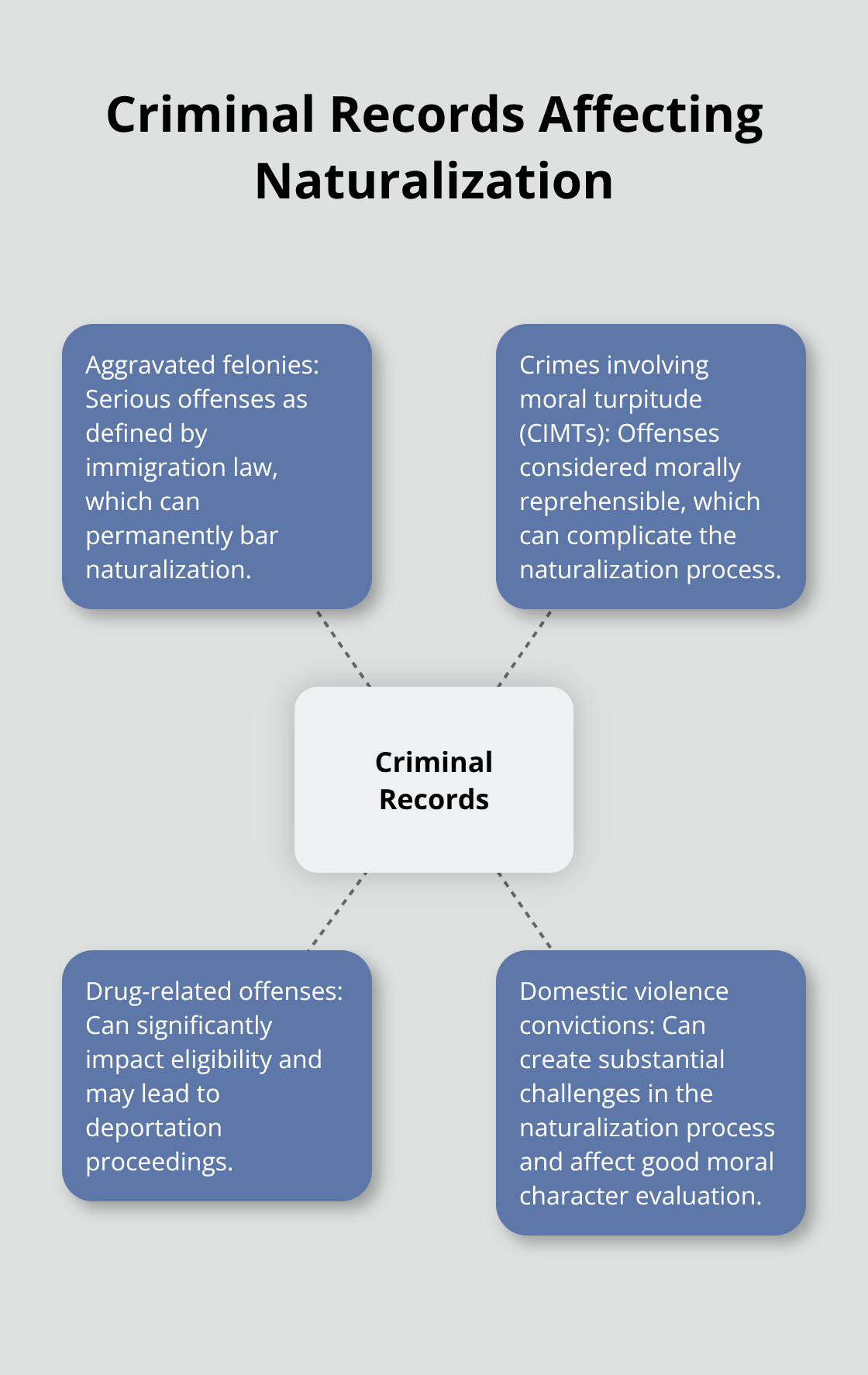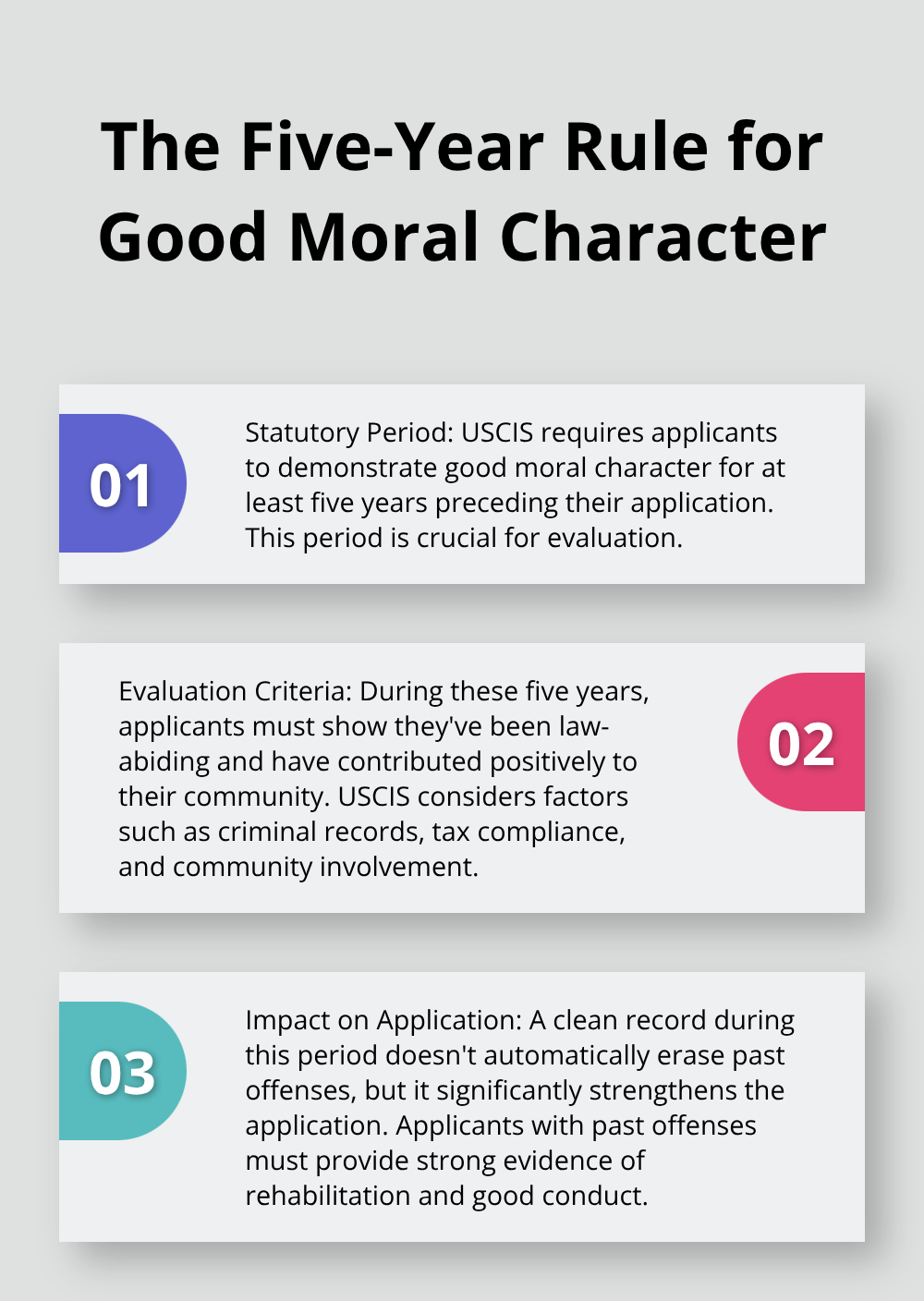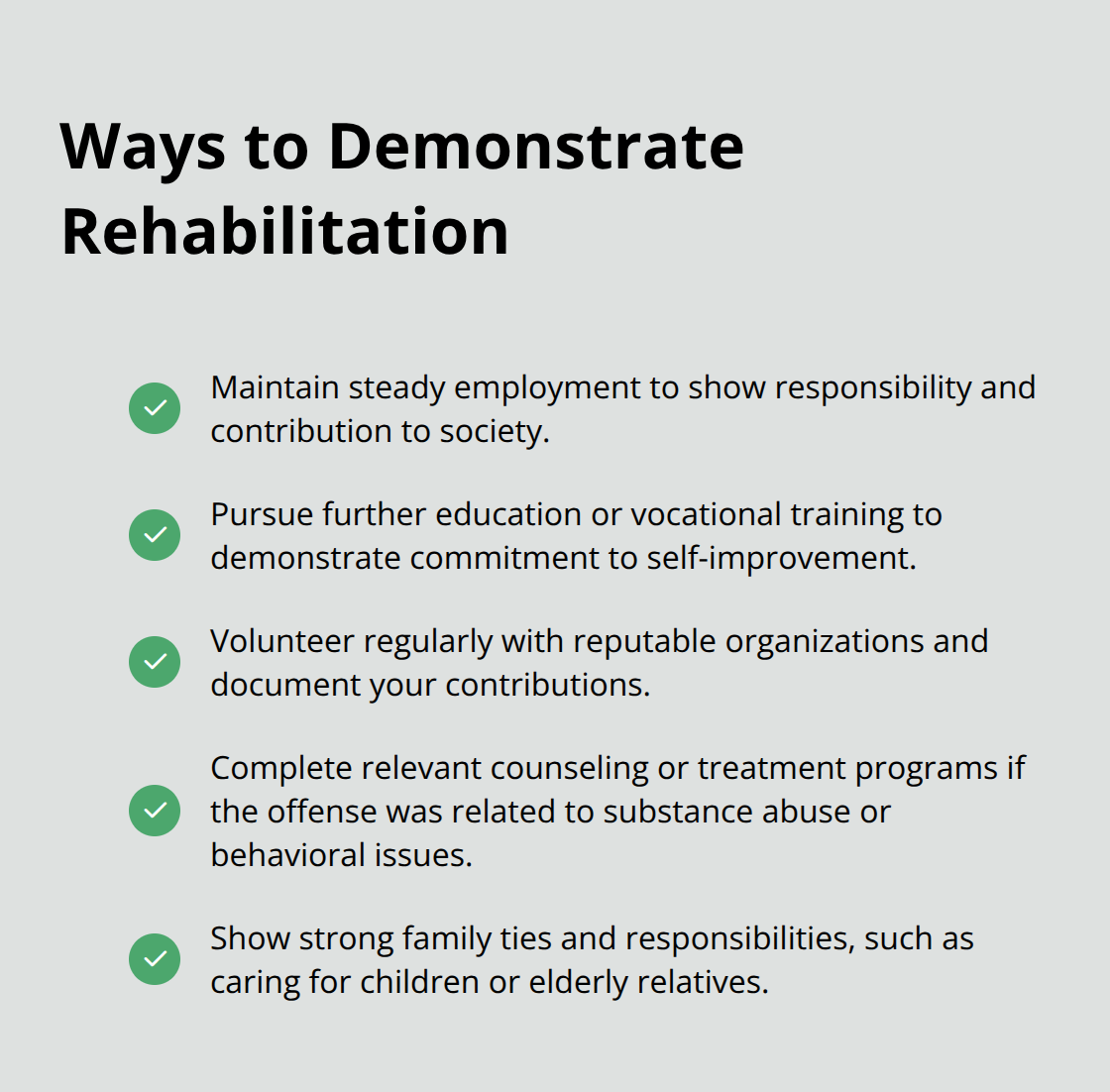
How to Naturalize with a Criminal Record?
Navigating the naturalization process with a criminal record can be challenging. At Law Offices of Jeffrey A. Thompson, we understand the complexities involved and the impact it can have on your citizenship journey.
This guide will explore the key factors affecting naturalization for those with a criminal history, including eligibility criteria and strategies to overcome potential obstacles.
What Is Naturalization and How Does a Criminal Record Affect It?
Naturalization transforms a foreign-born individual into a U.S. citizen through a legal process. This path to citizenship becomes more complex for those with a criminal record.
The Basics of Naturalization
The naturalization process typically requires applicants to have lived as a lawful permanent resident for at least five years (or three years if married to a U.S. citizen). During this period, applicants must prove their good moral character, which a criminal record can significantly impact.
Types of Criminal Records and Their Effects
Not all criminal records carry the same weight in immigration law. Minor infractions like traffic violations usually won’t hinder your application. However, more serious offenses can create substantial challenges:
- Aggravated felonies (as defined by immigration law)
- Crimes involving moral turpitude (CIMTs)
- Drug-related offenses
- Domestic violence convictions
Each of these offenses can affect your application differently, potentially resulting in delays, denials, or even deportation proceedings.

The Importance of Good Moral Character
Good moral character stands as a fundamental requirement in the naturalization process. U.S. Citizenship and Immigration Services (USCIS) evaluates an applicant’s conduct during the statutory period (typically the five years before the application) and beyond. A criminal record doesn’t automatically disqualify you, but it does complicate the process.
USCIS officers will consider several factors:
- The nature and severity of the offense
- The recency of the offense
- Whether it was an isolated incident or part of a pattern
- Evidence of rehabilitation
Overcoming Criminal Record Challenges
While a criminal record can pose obstacles, it doesn’t necessarily mean the end of your naturalization journey. Here are some strategies that can help:
- Full Disclosure: Always be honest about your criminal history. Attempting to hide or misrepresent past offenses can lead to severe consequences.
- Gather Documentation: Collect all relevant documents (court records, police reports, etc.) related to your criminal history. This information will help you and your attorney prepare a strong case.
- Show Rehabilitation: Demonstrate how you’ve changed since the offense. This can include community service, steady employment, or completion of rehabilitation programs.
- Seek Legal Assistance: The complexities of immigration law make professional guidance invaluable. An experienced immigration attorney can help navigate the challenges posed by a criminal record.
As we move forward, we’ll explore the specific eligibility criteria for naturalization with a criminal record, including a detailed look at the N-400 application form and the five-year rule for demonstrating good moral character.
Navigating Naturalization Eligibility with a Criminal Record
The N-400 Form: Your First Challenge
The N-400 application form serves as the gateway to U.S. citizenship. It’s not a simple form-filling exercise, but a comprehensive document that demands full disclosure of your criminal history. You must answer all questions truthfully and completely. Even if you think an offense was minor or happened long ago, you must disclose it. Failure to do so can result in your application’s denial or your citizenship’s revocation if discovered later.
Pay close attention to Part 12 of the N-400, which deals with questions about your moral character. This section asks about specific criminal offenses, including whether you’ve ever been arrested, cited, or detained by law enforcement. It also inquires about convictions, probation, and even traffic tickets.
The Five-Year Rule: Demonstrating Good Moral Character
USCIS requires applicants to demonstrate good moral character for at least five years preceding their application. Good moral character (GMC) means character which measures up to the standards of average citizens.
During these five years, you must show that you’ve been law-abiding and have contributed positively to your community. This doesn’t mean you’re automatically disqualified if you have a criminal record from before this period, but it does mean you’ll need to provide strong evidence of rehabilitation and good conduct.

Aggravated Felonies vs. Crimes Involving Moral Turpitude
Understanding the difference between aggravated felonies and crimes involving moral turpitude (CIMTs) is essential when applying for naturalization with a criminal record.
Aggravated felonies, as defined by immigration law, are serious offenses that can permanently bar you from naturalization. These include crimes like murder, rape, sexual abuse of a minor, illicit trafficking of drugs or firearms, and certain theft or burglary offenses. If you’ve been convicted of an aggravated felony, your chances of naturalization are severely limited.
CIMTs are offenses that involve conduct considered morally reprehensible and intrinsically wrong. These can include crimes like fraud, larceny, and intentional infliction of serious bodily injury. While CIMTs can complicate your naturalization process, they don’t always result in an automatic bar.
The impact of a CIMT on your application depends on factors like when the crime was committed, the sentence received, and whether it was an isolated incident or part of a pattern of behavior. In some cases, a single CIMT may not disqualify you if it was committed outside the statutory period and you can demonstrate good moral character since then.
Overcoming Criminal Record Challenges
If you have a criminal record and are considering naturalization, you must take proactive steps. Start by obtaining certified copies of all court dispositions related to your criminal history. These documents provide official records of the outcomes of your cases and are essential for your application.
Next, consider seeking post-conviction relief. This could involve having your record expunged or sealed, or obtaining a pardon. While these actions don’t erase your record for immigration purposes, they can demonstrate rehabilitation and potentially improve your chances of approval.
Lastly, focus on building a strong case for your good moral character. This could include letters of recommendation from employers, community leaders, or clergy members. Evidence of community service, steady employment, and family ties can also strengthen your application.
As we move forward, we’ll explore specific strategies to overcome obstacles related to criminal records in the naturalization process. These strategies will help you present the strongest possible case to USCIS and increase your chances of success.
Strategies to Overcome Criminal Record Obstacles
Obtain Certified Court Dispositions
The first step to strengthen your naturalization case involves the collection of all certified court dispositions related to your criminal history. USCIS requires applicants to provide court dispositions certified by the pertinent jurisdiction for any offense committed during the statutory period. These official documents provide essential details about your cases, including charges, pleas, and outcomes. You should contact the court where your case was heard and request certified copies of all relevant documents. This process can take time, so you should start early.
Some courts offer online systems for requesting documents, while others require in-person visits or mailed requests. You should prepare to pay fees for each document. If you’re unsure which documents you need, an immigration attorney can guide you through this process.
Explore Post-Conviction Relief Options
Post-conviction relief can significantly improve your chances of naturalization. For people whose convictions effectively close all doors to immigration relief, vacating the conviction in criminal court is the only way to preserve a chance. This may include expungement, sealing of records, or pardons. While these actions don’t erase your record for immigration purposes, they demonstrate rehabilitation and can positively influence USCIS’s decision.
Expungement laws vary by state, so you should research your options or consult a criminal defense attorney familiar with post-conviction relief. In Massachusetts, for example, certain misdemeanors can be sealed after a waiting period of three years, while felonies require a seven-year wait.
Prove Rehabilitation and Community Involvement
USCIS looks favorably upon applicants who can show they’ve turned their lives around. Here are effective ways to demonstrate rehabilitation:

Gather Character References
You should obtain letters from respected community members who can vouch for your good character. This might include employers, religious leaders, or long-time neighbors. These references can provide valuable insight into your personal growth and current standing in the community.
Ensure Tax Compliance
Try to stay up to date on all tax obligations. USCIS views tax compliance as a strong indicator of good moral character. This includes filing your taxes on time and paying any outstanding debts to the IRS.
Overcoming a criminal record in the naturalization process presents challenges, but it’s not impossible. You can significantly improve your chances of success by taking these proactive steps and working with an experienced immigration attorney.
Final Thoughts
The naturalization process with a criminal record presents unique challenges, but it is not impossible. Individuals with past offenses can pursue U.S. citizenship successfully through understanding immigration law, gathering necessary documentation, and showing rehabilitation. Transparency throughout the process is essential; applicants must disclose all relevant information about their criminal history, no matter how minor or distant it may seem.
The journey to citizenship requires dedication, patience, and often professional guidance. An experienced immigration attorney can provide invaluable support, helping applicants navigate the complexities of the N-400 application, prepare for interviews, and address issues that may arise due to their criminal record. At Law Offices of Jeffrey A. Thompson, we specialize in immigration law and have experience helping clients with naturalization criminal record cases.
For eligible individuals, pursuing citizenship can lead to life-changing results. Many people successfully complete the naturalization process each year, despite the obstacles posed by a criminal record. With proper preparation and determination, applicants can overcome these challenges and take a significant step towards realizing their American dream.


